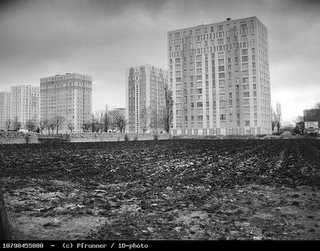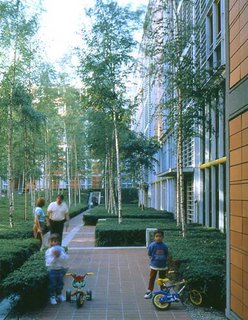"People here are bad. I don't want to live here anymore," Rebab Khalil, an 11-year-old whose divorced parents came from Tunisia, said when asked about the gangs. She lives in Saint-Denis, northeast of Paris, but she dreams of life "in a big house, on a quiet street. I want to live in the country, where it is calm." From CNN.
In the 1950s and 1960s, France fell prey to the same idea we did: that the way to improve housing for the poor was to build apartment buildings for them and rent them way below market rate. Projects, in other words; in French, HLM (
habitation à loyer modéré, moderate-rental housing). Here's one in Saint-Denis:

Would
you like to live there? I didn't think so. The idea was that poor people could live in an HLM for a few years, saving up for a down payment on a house or apartment, and then move out, making room for more poor people. As we all now know, this doesn't work: people don't move out, kids with nothing to do start committing vandalism and selling drugs, and the neighborhood goes to hell. Whatever stores originally existed close up shop, since you can't make money in a place where no one has money and the kids are constantly vandalizing and shoplifting. Normal life moves out; crime moves in. I lived in an HLM in
Saint-Denis in 1990; it wasn't safe to go out after dark (not that you'd want to, since there was nothing to do: all the shops, cafes, etc. had gone out of business).

HLM were built in the Modernist style, the complete antithesis of traditional French architecture. Compare that HLM to this traditional neighborhood in central Paris. Where would you, or any human being, rather live?
The problem with the HLM was that they weren't mixed-income; they were warehouses for the poor. In French cities, the traditional pattern is for each building to contain a mix of incomes: in old buildings (pre-elevator) the first floor or two above ground level contain the nicest apartments, with high ceilings and frou-frou woodwork. The quality and size of the apartments diminishes gradually until you reach the "chambre de bonne" (maid's room) on the top floor, six or seven flights of stairs up.
In modern buildings there is less mix, because elevators make all floors equally easy to reach, but some mix is still possible--e.g. top-floor penthouses may be more desirable, and apartments facing the quiet courtyard are more expensive than those facing the noisy street. You're not going to get a complete cross-section of society in a single building (some neighborhoods are more expensive than others, after all) but you get a mix. French society owes some of its more notable strengths--good public schools, for example--to this.
And the big lesson of the 1960s mistake--that is, of Modernist architecture and public housing--is this: poor people do a lot better when they're physically integrated with the rest of society than when they're warehoused all by themselves with thousands of other poor people. The whole 1960s concept of housing for the poor was delusional: what a great idea, let's put all the people who couldn't write a resume if their lives depended on it in one place, so they can meet, make friends, and share valuable skills such as "how to remain poor and unemployed"! Being middle class is about a lot more than money: it involves behavior, speech patterns, dress, lifestyle. You can't learn that if you're marooned in some project miles from the nearest middle-class people, and your kids can't learn it if all the kids in their school are poor too.
This is particularly a problem when you consider that France, more than, say, Britain, brought in a lot of immigrants who were already desperately poor and uneducated in their own country. India and Jamaica are so far from England that, to immigrate, you had to be doing somewhat okay just to afford a ticket. But Algeria is only a ferry-ride away from France. The mother of my best
beur (French Arab) friend got married at age 15 and is illiterate, even in Arabic, to this day. Before they immigrated to France, three of the eight children she had died in infancy. There are certainly plenty of Algerian and other North African immigrants who were doing okay back home and went to France in hopes of doing even better, but my guess is that France, compared to England, has a higher proportion of immigrants who were desperate, uneducated, and living in true third-world squalor before they came over. You can't warehouse thousands of people like that in HLM, school all their kids together without any better-situated classmates, and expect them to just spontaneously figure out how to succeed in France. And then there's the employment problem: in the US, France, or anywhere, submitting a resume or application with a ghetto housing project as your address stigmatizes you. HLMs were France's--and America's--biggest mistake.
(Did I mention that my friend "Leila" didn't grow up in an HLM? Her parents live in a little house with a garden and a couple of fruit trees in a mixed-race working-class neighborhood in a small town. Exactly the kind of place poor little Rebab Khalil wishes she lived.)
That's why these days, we're not building low-income projects. In the US, for example, federal dollars are subsidizing developments that mix low-income rental units with moderate-income rentals and units for purchase. I'm not up on the latest developments in France, but I do know they issue rent vouchers that can be used anywhere, and the income limits for getting an apartment in an HLM are high by US standards (details
here): for a family of four in the Paris area, if you're making under $47,600 a year, you can live in an HLM. For a family of three or a single parent with one child, the ceiling is just over $39,000. (For purposes of comparison, remember how low
poverty thresholds are set in the US: a family of four is not officially in poverty unless it's making less than $19,307/year). So maybe these high income limits are France's attempt to restore the normal French pattern of mixed income in housing, mixing the families that are doing reasonably well (nearly $50k/year!) with much poorer ones. Let's hope it works. Or maybe it can't work, now that the rioters have scared any sane person away. Damn them.




